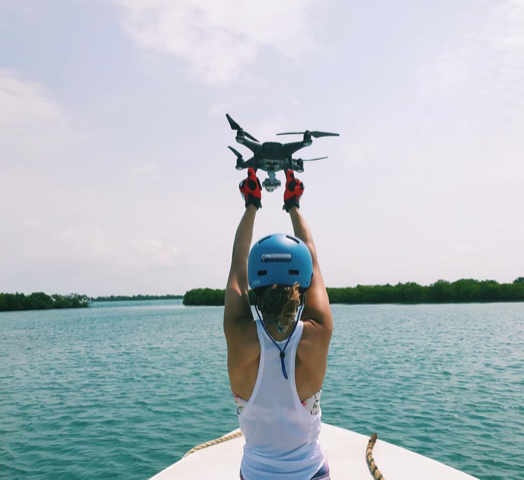


Alexandra DiGiacomo pilots drones coastlines near the Duke Marine Lab looking to identify, measure and analyze local sharks
2016 RHS grad Alexandra DiGiacomo began her summer mornings at sunrise on North Carolina’s coast piloting her Phantom 4 Pro drone searching for sharks. DiGiacomo, who recently became an FAA certified Remote Pilot, purchased a drone using a research grant received from Duke University which she aptly named “Genie” after Eugenie Clark. Her second drone is named "Rose" after Rosalind Franklin.
A rising senior at Duke University and undergraduate researcher at the Duke Marine Robotics and Remote Sensing Laboratory, Alexandra utilizes drones to study the distribution and density of coastal sharks in the nearshore waters of North Carolina.
In July, Alexandra was an invited speaker at an undergraduate drones course hosted by the Marine Robotics and Remote Sensing Laboratory. Alexandra gave presentations, worked with students to learn common software for analyzing drone imagery, and introduced students to her research by bringing them out into the field during transects.
Daily at sunrise and sunset, DiGiacomo conducted 1km transects to identify spatial hotspots for coastal sharks and gathered data on their movement patterns. By surveying across three coastal habitats: salt marsh, oyster reef and sandy beach, her quest was to understand if coastal sharks are demonstrating habitat preferences.
DiGiacomo says, "I hope that the findings from this project can eventually be used to predict important coastal shark habitat. If these sharks are found to be overfished, identifying critical habitat for these sharks can be crucial information in guiding how to protect them.”
Back in the lab, Alexandra combineed the survey data with environmental data like water temperature, air temperature, water depth, and bathymetry (structure/slope of the bottom surface) to understand what environmental factors encourage high shark density.
Alexandra, a Rescue Diver, who has spent much time underwater with sharks across the globe including Fiji, South Africa, and Belize remarked about her summer experience, “I’m beyond thrilled to have been able to explore shark behavior while in and out of the water this summer.”
This project will be DiGiacomo's senior thesis in Biology at Duke.
DiGiacomo’s passion for sharks began in 2012 when she attended a talk given by renowned marine biologist Dr. Sylvia Earle at the Maritime Aquarium in Norwalk thanks to an event posted on Hamlethub Norwalk. DiGiacomo, so moved, read Dr. Earle’s book, The World is Blue. Empowered and inspired by Earle’s words, "Sharks are beautiful animals, and if you're lucky enough to see lots of them, that means that you're in a healthy ocean," Alexandra began her own underwater journey.
Alexandra DiGiacomo is a rising senior at Duke University, an A.B.Duke Scholar and Rachel Carson Scholar. She volunteers with the Duke Marine Lab community science program which works with local Boys and Girls club students to teach about the local marine environment.
Follow her on twitter @A_DiGiacomo_
Read more on her website savingsharksforsaferseas.com